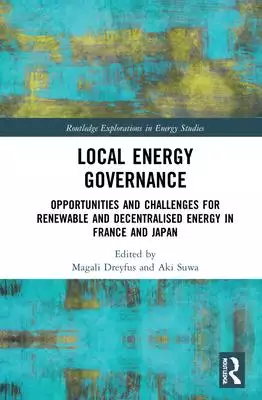France energy policy的問題,透過圖書和論文來找解法和答案更準確安心。 我們找到下列特價商品、必買資訊和推薦清單
France energy policy的問題,我們搜遍了碩博士論文和台灣出版的書籍,推薦寫的 Local Energy Governance: Opportunities and Challenges for Renewable and Decentralised Energy in France and Japan 和Claessens, Michel的 The Science and Politics of Covid-19: How Scientists Should Tackle Global Crises都 可以從中找到所需的評價。
這兩本書分別來自 和所出版 。
國立臺北科技大學 環境工程與管理研究所 王立邦所指導 吳德懷的 利用焙燒暨酸浸法從廢棄LED晶粒中回收鎵金屬資源 (2021),提出France energy policy關鍵因素是什麼,來自於發光二極體、氮化鎵、鎵、回收、焙燒、浸漬。
而第二篇論文逢甲大學 商學博士學位學程 賴文祥所指導 范志旻的 利用模糊層級分析法 探討半導體產業品牌影響因素之分析 (2021),提出因為有 模糊層次分析法、半導體產業品牌、關鍵影響因素的重點而找出了 France energy policy的解答。
除了France energy policy,大家也想知道這些:
Local Energy Governance: Opportunities and Challenges for Renewable and Decentralised Energy in France and Japan

為了解決France energy policy 的問題,作者 這樣論述:
Magali Dreyfus is a researcher at CNRS (French National Centre for Scientific Research). She is based at CERAPS (Center for European Research on Administration, Politics and Society) - Lille University in France. Formerly, she was a Visiting Fellow at GRIPS (National Graduate Institute for Policy St
udies) and a research fellow at the United Nations University, Institute of Advanced Studies, in Tokyo, Japan. Aki Suwa is a professor at Kyoto Women’s University, and an Instructor at the College of Policy Science, Ritsumeikan University, Japan, after being a research fellow at the United Nations U
niversity Institute of Advanced Studies.
利用焙燒暨酸浸法從廢棄LED晶粒中回收鎵金屬資源
為了解決France energy policy 的問題,作者吳德懷 這樣論述:
LED是發光二極體(Light Emitting Diode)的簡稱。由於LED燈具有節能、無汞等特性,在照明市場之需求日益增加,LED在許多領域已經取代了傳統光源(白熾燈、螢光燈等)。LED燈之高效率白光照明主要是由LED晶粒中氮化鎵(GaN)半導體所產生。隨著LED市場的擴大,未來將產生大量的LED廢棄物。因此,回收廢棄LED中所含的鎵金屬資源對於資源的可持續利用和環境保護都具有重要意義。本研究以廢棄LED燈珠為對象,利用焙燒與酸浸法從其LED晶粒中回收鎵金屬資源,主要包括三個部分:化學組成分析、氟化鈉焙燒處理與酸溶浸漬等。探討各項實驗因子包括焙燒溫度、焙燒時間、礦鹼比、酸浸漬種類及濃度
、浸漬時間、及浸漬固液比等,對於鎵金屬浸漬率之影響,並與各文獻方法所得到的鎵金屬浸漬效果進行比較。研究結果顯示,LED晶粒中含有鎵5.21 wt.%,氟化鈉焙燒暨酸溶浸漬之最佳條件為焙燒溫度900 ℃、焙燒時間3hr、礦鹼比1:6.95、鹽酸浸漬濃度0.5 M、浸漬溫度25 ℃、浸漬時間10mins、固液比2.86 g/L,鎵金屬浸漬率為98.4%。與各文獻方法相比較,本方法可於相對低溫且常壓下獲得較高之鎵金屬浸漬效果。
The Science and Politics of Covid-19: How Scientists Should Tackle Global Crises

為了解決France energy policy 的問題,作者Claessens, Michel 這樣論述:
Michel Claessens holds a PhD from Brussels’ University. His background is physical chemistry and science journalism. He joined the European Commission in 1994 where has been acting Head of the Communication Unit in the Research Directorate-General, spokesperson for research, editor-in-chief of the r
esearch*eu magazine and in charge of the science and technology Eurobarometers until 2010. In April 2011, Michel became Head of Communication and External Relations at the ITER Organization in Cadarache (France). He is now in charge of ITER policy and communication in European Commission’s Directora
te-General for Energy. In parallel, Michel also teaches science journalism and science communication at the University of Brussels. Michel’s numerous publications include scientific articles in peer-reviewed journals, books on science policy and science communication, many press articles and partici
pation in science television programmes. His latest book, ’ITER, The Giant Fusion Reactor’ has been published by Springer. A specialist of science policy, science communication and public perception of science, Michel is an active member of international scientific networks (PCST, ESOF, etc.) and a
frequent speaker at international conferences (Chinese Association for Science Communication, AAAS, TEDx, etc). He is currently developing a project on science culture bringing together fifteen teams of international experts.
利用模糊層級分析法 探討半導體產業品牌影響因素之分析
為了解決France energy policy 的問題,作者范志旻 這樣論述:
隨著時間的流逝,半導體創新正在發生變化,可以適用於不同的創新業務,半導體業務的發展至關重要,因而開闢了許多新的職位。半導體業務是一個融合了不同創新能力並協調上游,中途和下游提供商的專業能力的行業,並且通常具有較高的進入壁壘 。廠家已投入花費很多精力與成本進入這個行業,期盼永續經營與回饋利害關係人。本研究第一步採用PEST, 五力 & SWOT分析,在美國,日本和臺灣,這些是國際半導體供應商鏈中的關鍵成員。經過最新半導體有關文獻的討論和分析,發現現有廠商已經建立了行業品牌,並獲得了用戶的信任。因此,品牌研究在這個行業是大家一直在探索的領域。考慮到寫作對話和大師談話,本研究使用分析層次結構(A
HP)研究技術對品牌的關鍵指針在半導體品牌的關鍵部件上進行重要性的排序,然後利用模糊層次分析法(FAHP)來分析這些標記之間的聯繫。經調查,有11項顯著結果可供參考,關鍵是要在半導體品牌建設上取得優異的成績,“客戶價值”和“品牌資產”都必須達到一定的水平。本研究發現,半導體品牌策略應以“客戶價值”為核心,解決客戶問題,創造卓越價值,並隨著技術的進步不斷投入新產品的研發,以奠定半導體品牌長期成功的基礎。